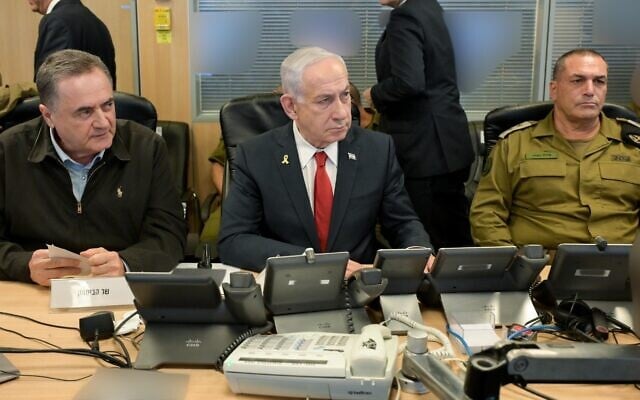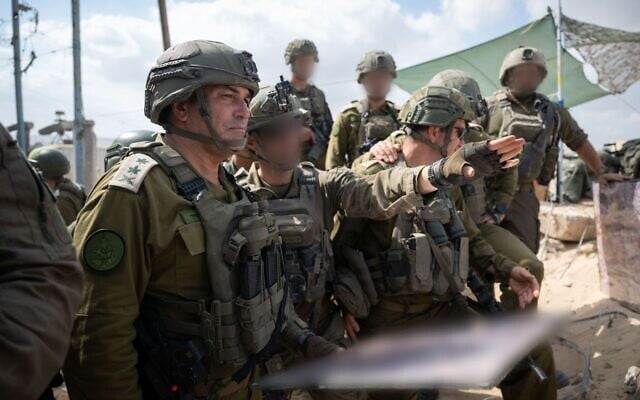



Israeli leaders on Wednesday dismissed a statement from Hamas declaring its willingness to free all the hostages in an exchange for ending the war in Gaza, vowing to go ahead with the planned invasion of Gaza City if the Palestinian terror group doesn’t accept Jerusalem’s conditions to permanently halt the fighting.
The statement from Hamas, which said the terrorist organization was still waiting for Israel’s reply to the ceasefire proposal it accepted two weeks ago, came after US President Donald Trump demanded the release of the remaining living captives.
Hamas stressed that it was willing “to enter into a comprehensive deal in which all enemy prisoners held by the resistance will be freed in exchange for an agreed-upon number of Palestinian prisoners held by the occupation.” Hamas refers to the hostages it holds as prisoners.
“This agreement will end the war on the Gaza Strip, result in the withdrawal of all occupation forces from the entire Gaza Strip, open the border crossings to allow the entry of all the Gaza Strip’s necessities and start the process of rebuilding,” Hamas continued.
The terror group emphasized that it was ready to form “an independent national administration of technocrats” to run Gaza.
Israel has said it would only accept such if Hamas surrenders and disarms, which Prime Minister Benjamin Netanyahu reiterated in his response to the statement.
“This is more spin by Hamas, containing nothing new,” Netanyahu’s office said.
The Prime Minister’s Office said the war can end immediately if five conditions are met — the release of all hostages; the disarmament of Hamas; the demilitarization of the Gaza Strip; Israeli security control in Gaza; and “the establishment of an alternative civilian administration that does not indoctrinate for terror, does not dispatch terror, and does not threaten Israel.”
“Only these conditions will prevent Hamas from rearming and repeating the October 7 massacre again and again, as it openly vows to do,” Netanyahu’s office added.
In a similar message, Defense Minister Israel Katz called on Hamas to either accept Israel’s conditions to end the war — including the release of all hostages and disarmament — or see Gaza City “become like Rafah and Beit Hanoun,” accusing the terror group of continuing to “deceive and utter empty words.”
Responding to Netanyahu and Katz, Opposition Leader Yair Lapid said that while the government “does not have to accept Hamas’s conditions, it must immediately return to negotiations and try to close a deal.”
“You can’t not even try to return our hostages home,” added Lapid.
Head of The Democrats opposition party Yair Golan issued a more stinging criticism, saying that rather than seeking a deal to free the captives Netanyahu “is again choosing to forsake the lives of the hostages and soldiers for his own sake.”
Meanwhile, Israeli television reported Wednesday that IDF Chief of Staff Eyal Zamir is planning to warn the government that there will be no option but to impose military rule over the Gaza Strip if the plans go ahead to conquer Gaza City.
“There will be no choice but to impose military rule on all of Gaza from November,” Channel 12 news quoted Zamir as saying he will tell the government.
Zamir is opposed to the government’s plan to conquer Gaza City and has urged the government to accept the deal to reach a ceasefire that will see the hostages released.
The TV report said Zamir will carry out the orders to capture Gaza City, but is warning the government to prepare for the military and diplomatic consequences.
The government has advanced the takeover plan in recent weeks despite Hamas saying it had agreed to a phased hostage-truce deal almost identical to one Israel had previously approved. In the interim, Jerusalem had officially given up on phased deals, demanding a comprehensive agreement to return all the captives in one go and see Hamas surrender.
The phased deal — which Hamas said it agreed to on August 18 — would see 10 living hostages released and the remains of 18 dead hostages returned, in exchange for the release of hundreds of Palestinian security prisoners and some 1,000 Gazan detainees, and a 60-day ceasefire, during which negotiations would be held for the return of the remaining 20 hostages, of whom 10-12 are believed to be alive, and a permanent end to the war.


